December 24, 2024 | 10:45 GMT +7
December 24, 2024 | 10:45 GMT +7
Hotline: 0913.378.918
December 24, 2024 | 10:45 GMT +7
Hotline: 0913.378.918
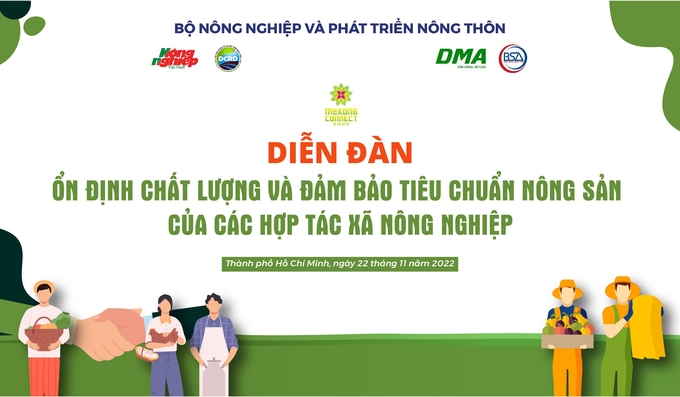
The forum for "Stabilizing quality and ensuring standards of agricultural cooperatives' products" was held on November 22.
Consumers' understanding of the quality of agricultural products and food is more extensive than that of producers. As a result, consumers are extremely cautious of all agricultural products on the market; even if the products are produced by agricultural cooperatives, VietGAP-certified and organic businesses, and distributed on modern consumption channels such as supermarkets and convenience stores.
The consumers' caution is entirely grounded because many cooperatives have not established a brand for their products and confirmed the quality of agricultural products on the market.
The Organizing Committee of Mekong Connect 2022 Forum, Vietnam Agriculture Newspaper, University of Agriculture and Rural Development Management 2, the Department of Cooperatives and Rural Development under the Ministry of Agriculture and Rural Development coordinated to organize the direct and online Forum for "Stabilizing quality and ensuring standards of agricultural cooperatives' products" on November 22.
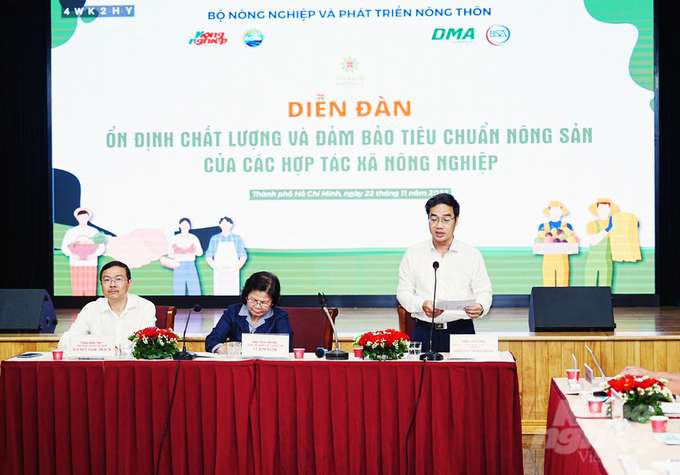
The forum hosts (in order from left to right) are Mr. Nguyen Ngoc Thach, Ms. Vu Kim Hanh and Mr. Nguyen Trung Dong.
The forum was hosted by Mr. Nguyen Ngoc Thach - Editor-in-Chief of Vietnam Agriculture Newspaper; Mr. Nguyen Trung Dong - Rector of University of Agriculture and Rural Development Management 2; and Ms. Vu Kim Hanh - Chairman of Vietnam High Quality Goods Business Association. Among the forum's attendees were leaders of units under the Ministry of Agriculture and Rural Development as well as hundreds of agricultural cooperatives and businesses.
In addition to the discussion between experts at the forum, domestic and foreign cooperatives shared production experiences of cooperatives and businesses in the effort to ensure quality requirements and integration standards. Moreover, the forum is a platform to exchange information between directors of cooperatives, businesses, experts and management agencies on agricultural product quality standards.
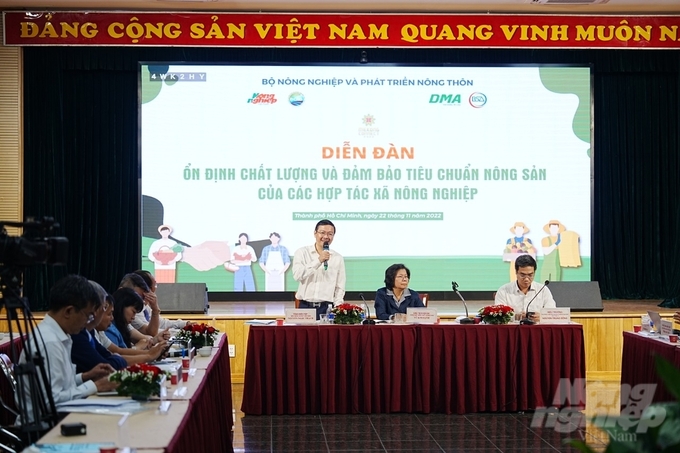
Mr. Nguyen Ngoc Thach, Editor-in-Chief of the Vietnam Agriculture Newspaper, said that high costs and poor quality issues can only be resolved when the cooperative economy develops and operates in a highly unified manner in terms of trading and production.
At the end of the forum, Mr. Nguyen Ngoc Thach, Editor-in-Chief of the Vietnam Agriculture Newspaper, reaffirmed the need to "stabilize quality and ensure standards of agricultural cooperatives' products".
Mr. Thach also highly commended that the forum had gathered experts, scientists, entrepreneurs, cooperatives and producers who offered many candid, high-quality and inclusive comments.
According to the Editor-in-Chief, the opinions of managers, experts as well as the suggestions and advice from cooperative leaders at the forum are valuable practical documents; which further reinfored the fact that high costs and poor quality issues can only be resolved when the cooperative economy develops and operates in a highly unified manner in terms of trading and production. Namely, stabilizing the quality and ensuring the standards of agricultural products to meet the standards of the domestic and international markets play an indispensible role.
The Ministry of Agriculture and Rural Development has identified cooperatives as a part of the rural economy and reactivated the agricultural structure, promoting the transformation of growth models, and shifting focus towards improving social welfare in rural areas. These aspects are reinforced with the substantive participation of State management agencies and the business community in additon to the cooperatives' constant adaptation to match the trend. Accordingly, the effort to grasp and meet market agricultural product standards is increasing.
“The Forum will be one of the opportunities to renew our mindset: Transforming from agricultural production to agricultural economic in accordance with the Strategy for Sustainable Agriculture and Rural Development from 2021 to 2030, with a vision towards 2050", Mr. Thach commented.
“We strongly believe that with the mindset of 'groups create strength', 'cooperation - association - market', nearly 35,000 agricultural cooperative groups and more than 18,000 agricultural cooperatives with over 3.2 million members will become a solid fulcrum for Vietnam's agriculture", exclaimed the Editor-in-Chief.
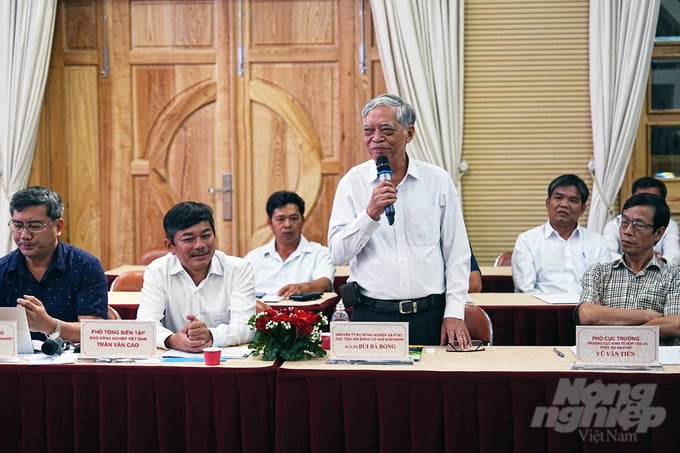
Former Deputy Minister of Agriculture and Rural Development Bui Ba Bong said that it is necessary to narrow the gap between producers, distributors and consumers.
Assoc. Prof. Dr. Bui Ba Bong, former Deputy Minister of Agriculture and Rural Development, shared at the Forum that the development of agriculture towards sustainable and circular direction is not exclusive to Vietnam but it is also a common trend among developed countries including the Netherlands, Japan, etc. with strong commitments.
Assoc. Prof. Dr. Bui Ba Bong said that it is necessary to narrow the gap between producers, distributors and consumers: "We must avoid situations where consumers are unaware of the product origin and farmers are unaware of the feedback to their products”. In addition, he also suggested to shorten the production chain and promote efficiency in both producers and consumers; and strengthen the localization in agricultural production, starting from the locality before expanding further.
Assoc. Prof. Dr. Bui Ba Bong also said that "vertical agriculture" is also being supported by many developed countries and cities in an effort to improve the self-sufficiency capacity of agricultural products.
Assoc. Prof. Dr. Bui Ba Bong believes that the most urgent requirement for Vietnam agriculture currently is an effective link between cooperatives and businesses: "We have many cooperatives and businesses, but there is a lack of effective linkage to produce along the value chain, creating safe, environmentally friendly and high-value products."
Mr. Chau Van Lam, a resident of My Phuoc town, Tan Phuoc district, Tien Giang province, said that the town currently has over 2,000 hectares of pineapples in need of consumption. The purchasing price for pineapple is unstable, whereas the price of materials is high, so farmers suffer from losses.
Mr. Pham Quoc Liem, General Director of Unifarm Binh Duong Company, reported that the market is currently in high demand for MD2 pineapple products; and alkaline soil is incompatible with the production of Queen pineapple. "Additionally, MD2 pineapple growing area is required to have a sea level of at least 400m to meet the standard crunchiness; so if MD2 pineapples are grown in lowland, the output will be more limited", said Mr. Liem.
In addition, another reason behind the difficulty in pineapple consumption is the fact that there is currently no business Vietnam that can handle post-harvest packaging in accordance with international standards.
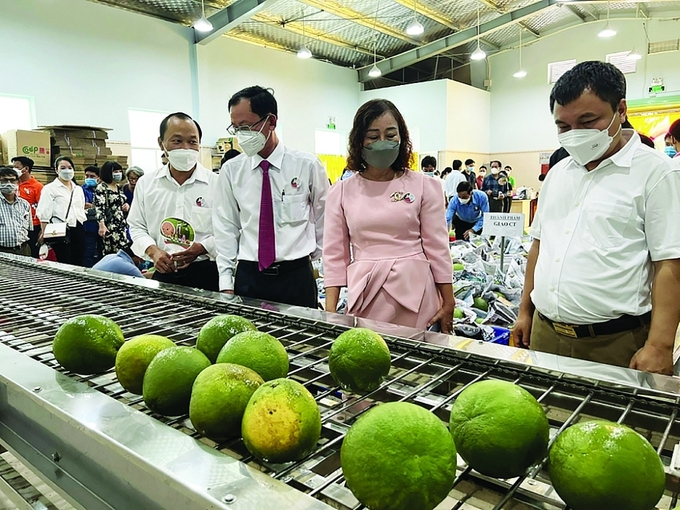
Vietnam will export green-skinned pomelo to the US in the immediate future before proceeding with other specialty pomelos. Photo: Customs Newspaper.
Dr. Phan Thi Thu Hien, Director of the Post-Import Plant Quarantine Center 2 under the Department of Plant Protection said that grapefruit is the 7th Vietnamese fruit to be imported into the US market following mango, longan, lychee, dragon fruit, rambutan and star apple.
According to US regulations, the growing area and processing facility for fresh Vietnamese pomelo exports to the US must be registered with the Department of Plant Protection and the US Animal and Plant Health Inspection Service (APHIS). Pomelos must not be infected with plant quarantine objects of interest to the US; they must also be irradiated and granted a phytosanitary certificate by the Department of Plant Protection.
Ms. Hien noted that pomelo exports to the US must ensure that the fruit has no blemishes on the surface and they must be packed in a US-licensed packaging facility. The pomelo will be irradiated at facilities licensed by APHIS. Regarding plant quarantine, the pressure to manage pests and diseases in the fields and growing areas plays a core role in export. On the other hand, the current solution of fruit packaging has proven to be the safest.
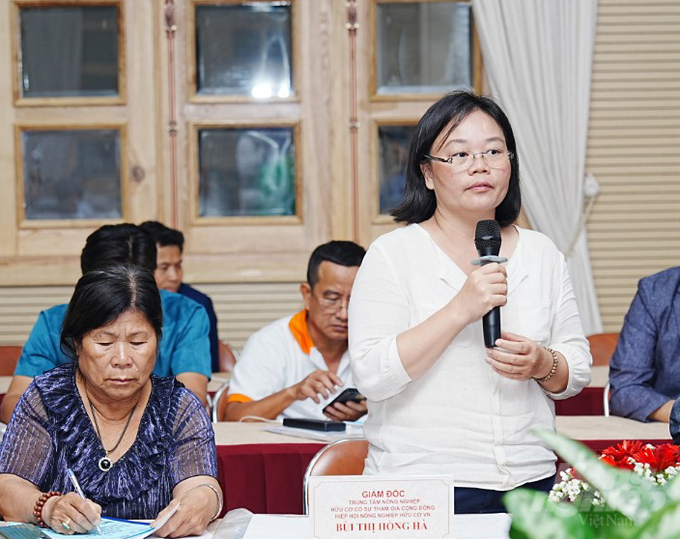
Ms. Bui Thi Hong Ha, Director of the Center for Organic Agriculture with Community Participation under the Vietnam Organic Agriculture Association, shared regarding the lack of solutions to stabilize the quality of agricultural products for export. "The Center is willing to share the solutions with regards to plant protection and quality control of agricultural products", said Ms. Ha.
According to Ms. Ha, the center has worked with a major tea export company to develop a simple, cost-effective plant protection process with high feasibility for large-scale deployment. This procedure can be modified to apply to rice or fruit crops. She introduced several effective and low-cost plant protection solutions such as the application of wood vinegar, herbs, metarhizium anisopliae and so on.
For fungal diseases in plants, residues of pesticides to prevent fungal diseases are in abundance. However microorganisms, andprobiotics can prevent fungal diseases on multiple plants such as tea, rice, fruit trees, etc. These preparations have been selected by the Center for Organic Agriculture in a scientific project and they have been applied to many different regions, yielding positive results.
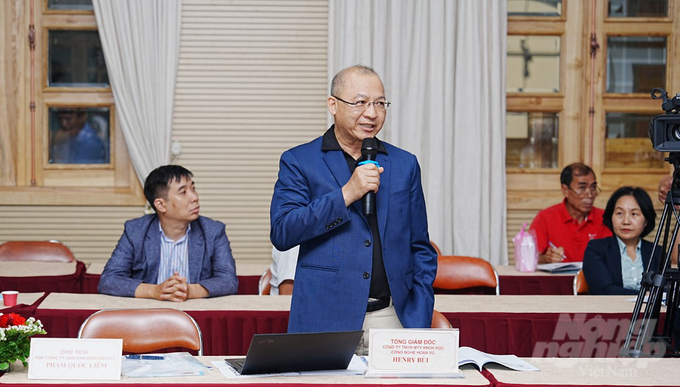
Mr. Henry Bui, General Director of Hoan Vu Science and Technology Co., Ltd affirmed that quality and traceability information is the passport for agricultural exports.
After 15 years of operation, Hoan Vu Company possesses the skills to analyze, determine the quality, and trace the origin of agricultural products using molecular technology, namely through stable isotopes. "Stable isotope analysis techniques enable the analysis of stable isotope composition of specific compounds, providing deeper exploration into the fundamental processes responsible for ecological or environmental change at the molecular level", explained Mr. Henry Bui.
With this technology, Hoan Vu Company can identify traces of sugar in honey, the organic origin of dragon fruit, substances added to fruit juice, distinguish farmed black tiger shrimp from natural black tiger shrimp or determine whether the fertilizer used is organic or not. With the such capacity, the General Director of Hoan Vu Science and Technology Co., Ltd affirmed that stable isotope analysis technique opens the way for the era of origin authentication for agricultural products as well as other types of food.
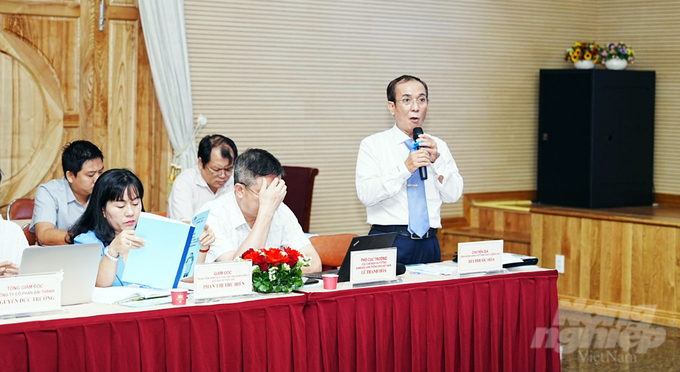
Mr. Bui Phuoc Hoa, a representative of the Vietnam Association of High Quality Goods, said that standards are common criteria to identify and minimize risks along a customer's supply chain including activities, processes, systems, people or capabilities.
However, the current process of developing standards for agricultural products is facing difficulties. The first of which is the issue of cost, including standard construction costs, equipment and infrastructure costs, testing and inspection costs, and management costs.
The second difficulty is time, including the time to control the stages according to the standards, the time to make and maintain records, the time to re-evaluate the activities performed and the time to update and exchange the information.
The third issue is the production culture, including management model according to household size, unclear separation of roles, responsibilities and powers of the staff, habits and practices of cultivation/cultivation, among many others.
In order to solve these difficulties, the Vietnam High Quality Goods Business Association proposes several solutions. Namely, state management agencies need to be consistent in terms of policies, establish regulations across ministries, organize training or support training costs on standards.
On the other hand, farmers need to promote linkages and transparency of responsibilities in addition ot the benefits. They also need a knowledgeable and conscientious guide to help them understand the benefits of standards compliance and consistent product quality.
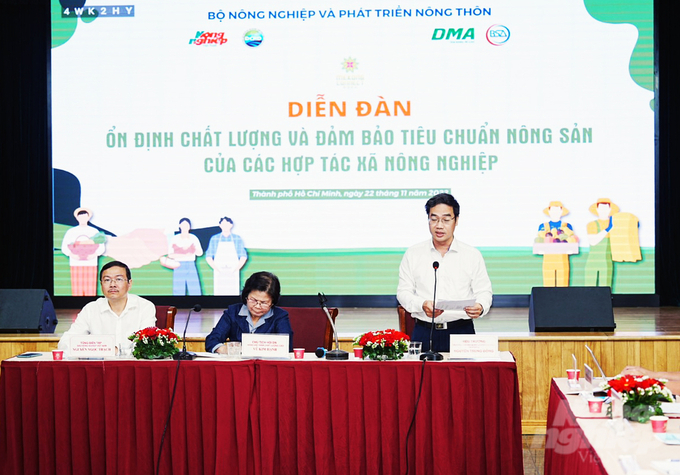
In the opening speech, Mr. Nguyen Trung Dong, Rector of the University of Agriculture and Rural Development Management 2 mentioned information related to standards and regulations for agricultural products for cooperatives, with the aim of making agricultural production more sustainable.
According to Mr. Dong, the agricultural product market is rapidly expanding, various products are officially exported to major markets, and the standards are also higher. In order to meet these requirements, cooperatives need to consolidate, change and develop production. This forum has helped experts from the agricultural sector as well as leaders of many businesses contribute ideas, guiding cooperatives in production in the near future.
Translated by Nguyen Hai Long
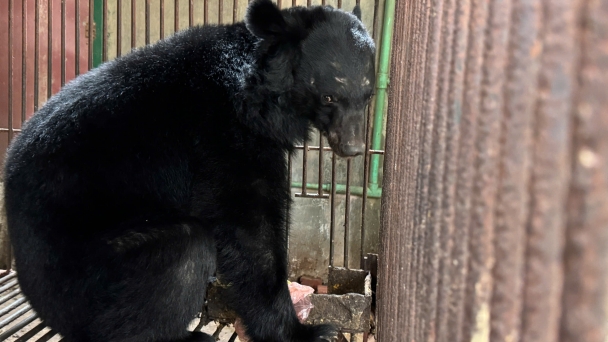
(VAN) Animals Asia, in coordination with the Lao Cai Forest Protection Department, received a moon bear that was illegally kept in Bao Thang district, Lao Cai province.
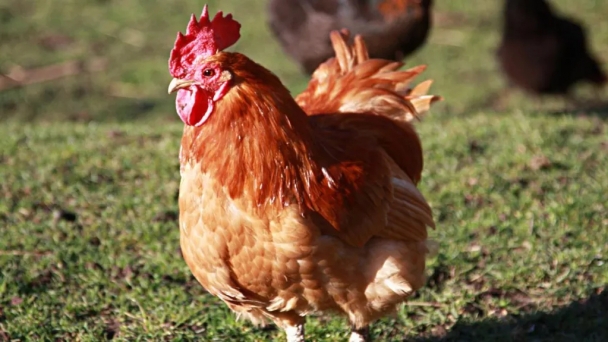
(VAN)All poultry and other captive birds in parts of Yorkshire and the East of England will have to be kept indoors from 23 December to prevent the spread of bird flu, the government has said.
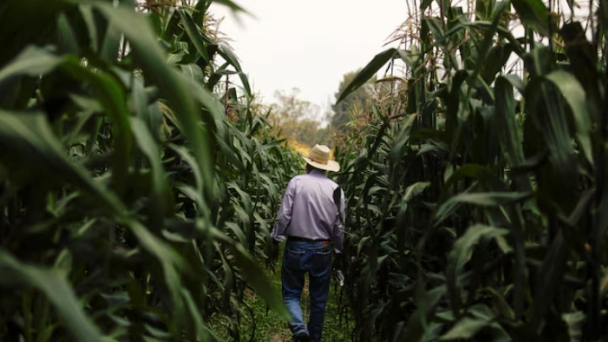
(VAN) Mexican President Claudia Sheinbaum expects Congress to approve a ban early next year on planting genetically modified corn in the country, she said on Saturday.

(VAN) Lam Son Sugarcane JSC partners with other enterprises to launch a carbon-emission reduction project.
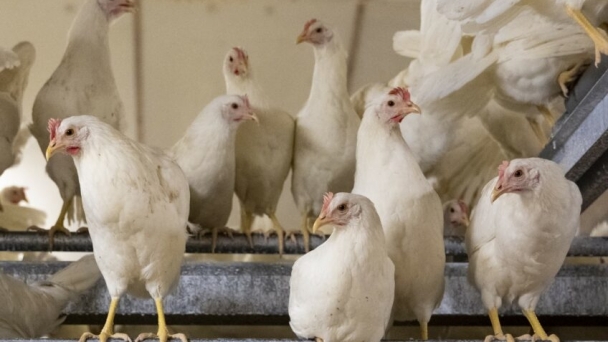
(VAN) Award-winning farmers were given the opportunity to showcase innovation, flock welfare, traceability and sustainability during the first farm tour for UK cross-party MPs.
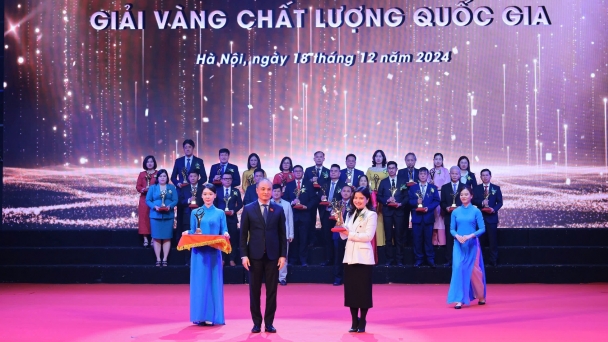
(VAN) On the evening of December 18th in Hanoi, the Ministry of Science and Technology held a ceremony to present the National Quality Awards for the years 2021, 2022 and 2023 to 133 businesses.
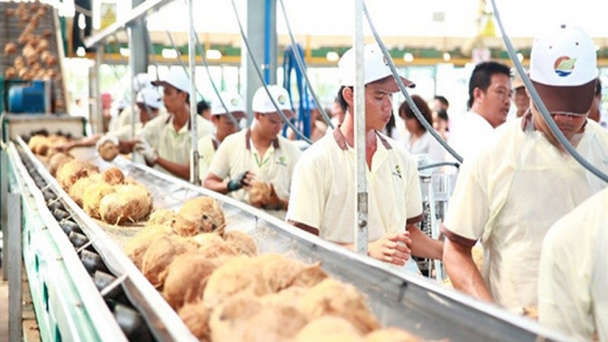
(VAN) On December 18, MARD and the People's Committee of Tien Giang Province hosted a forum in My Tho City to discuss the promotion of FDI and the increase in the export of coconut products.